TLH 210 - Current Issues in Tourism and Hospitality: UK Focus
VerifiedAdded on 2023/06/09
|12
|3973
|358
Essay
AI Summary
This essay provides an overview of the current issues facing the tourism and hospitality industry, with a specific focus on the United Kingdom. It highlights the impact of technological advancements, the growing importance of sustainable practices, and the challenges related to changing consumer behavior. The essay also discusses key issues such as implementing technology while maintaining human interaction, managing online reputation, employee retention, security infrastructure, and the complexities of loyalty programs. Furthermore, it addresses the impact of taxation and pricing on the tourism sector, emphasizing the need for a balanced approach to support the industry's economic contribution. The essay concludes by underscoring the importance of addressing these challenges to ensure the continued growth and sustainability of the tourism and hospitality sector in the UK.
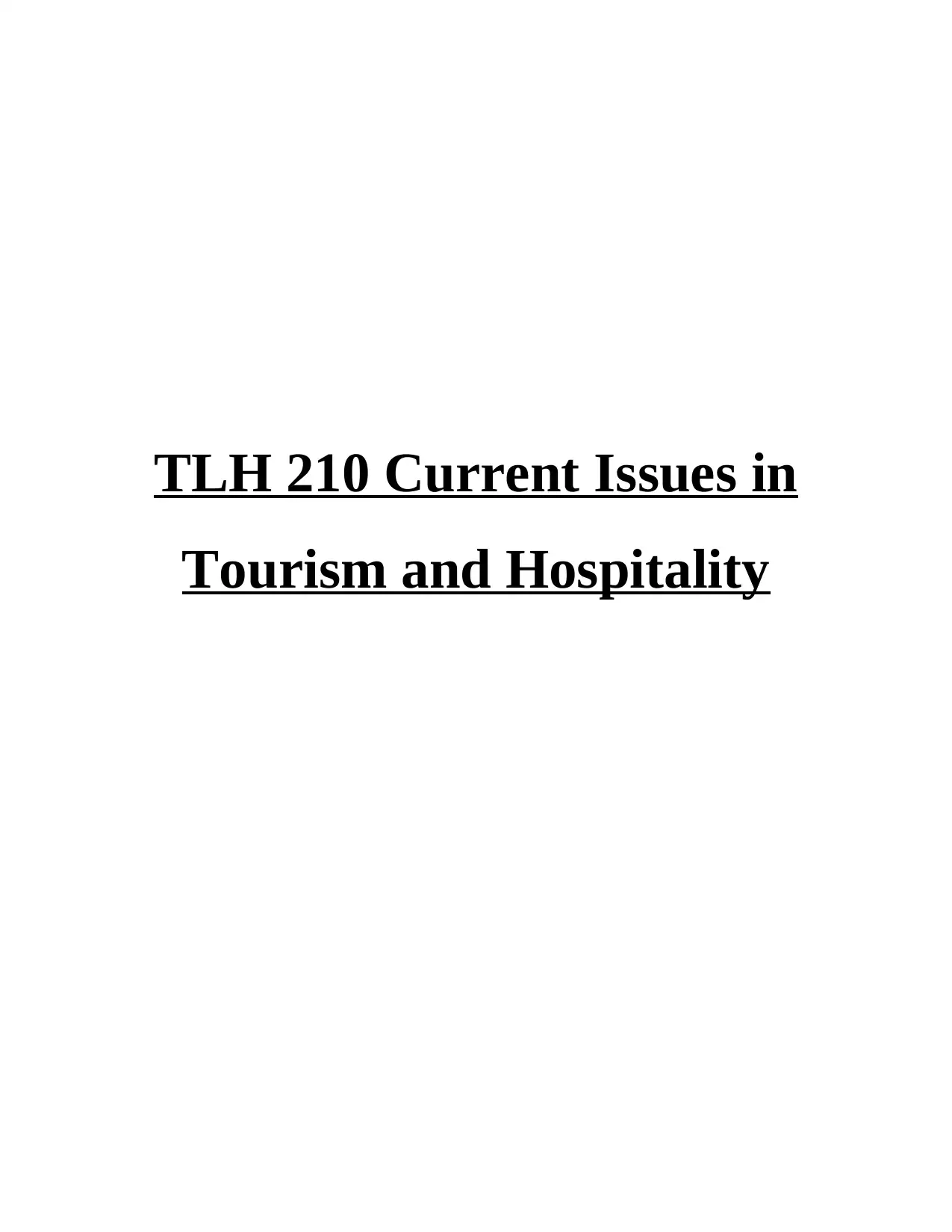
TLH 210 Current Issues in
Tourism and Hospitality
Tourism and Hospitality
Paraphrase This Document
Need a fresh take? Get an instant paraphrase of this document with our AI Paraphraser
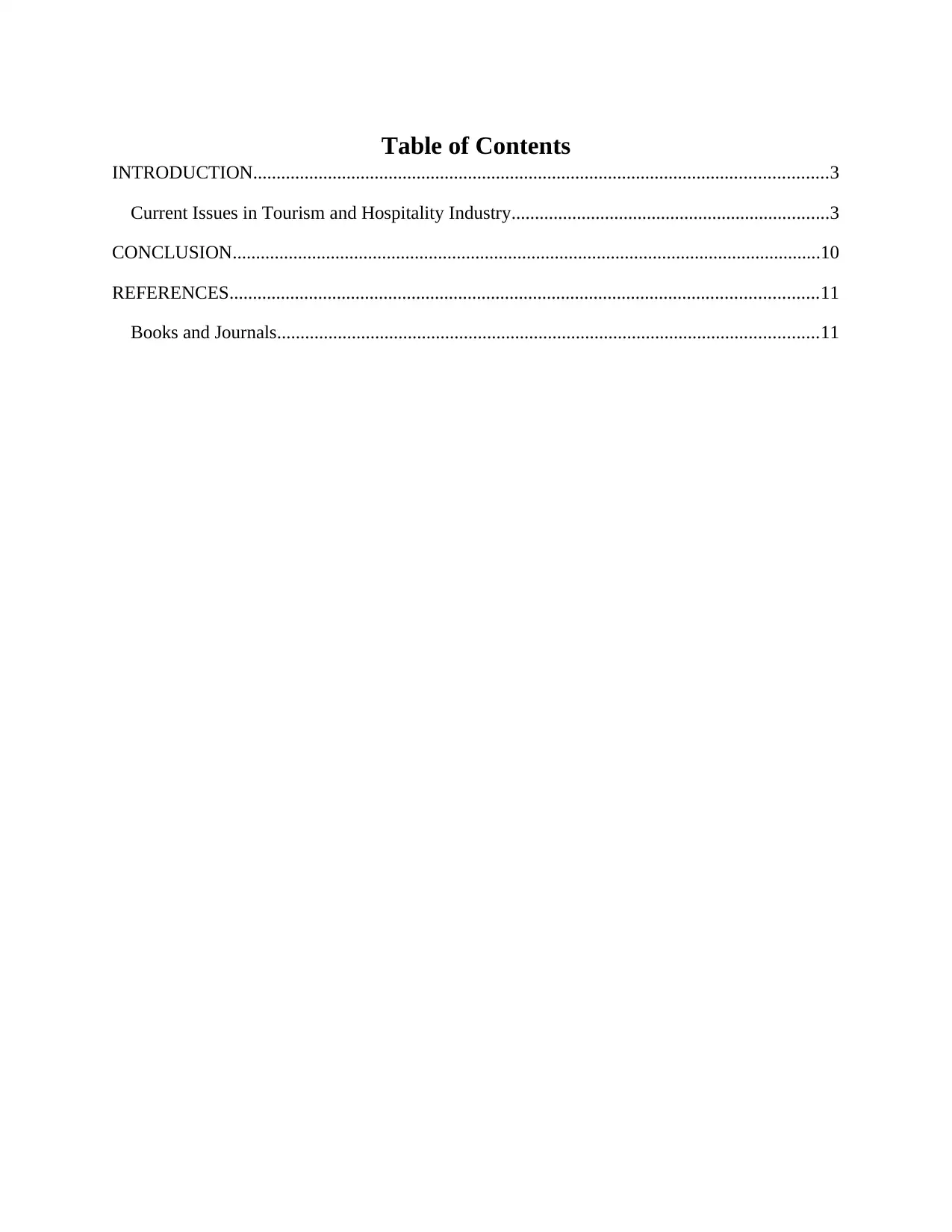
Table of Contents
INTRODUCTION...........................................................................................................................3
Current Issues in Tourism and Hospitality Industry....................................................................3
CONCLUSION..............................................................................................................................10
REFERENCES..............................................................................................................................11
Books and Journals....................................................................................................................11
INTRODUCTION...........................................................................................................................3
Current Issues in Tourism and Hospitality Industry....................................................................3
CONCLUSION..............................................................................................................................10
REFERENCES..............................................................................................................................11
Books and Journals....................................................................................................................11
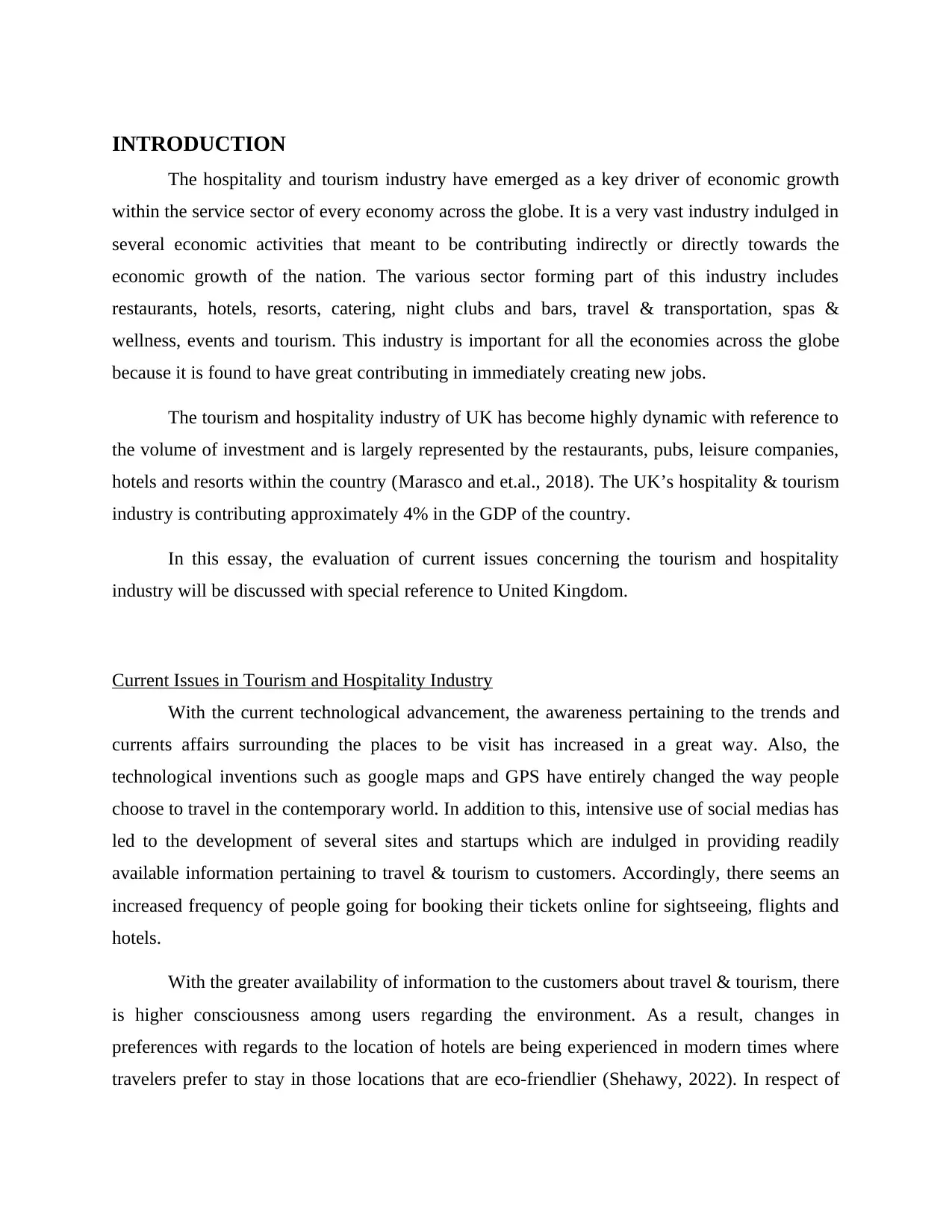
INTRODUCTION
The hospitality and tourism industry have emerged as a key driver of economic growth
within the service sector of every economy across the globe. It is a very vast industry indulged in
several economic activities that meant to be contributing indirectly or directly towards the
economic growth of the nation. The various sector forming part of this industry includes
restaurants, hotels, resorts, catering, night clubs and bars, travel & transportation, spas &
wellness, events and tourism. This industry is important for all the economies across the globe
because it is found to have great contributing in immediately creating new jobs.
The tourism and hospitality industry of UK has become highly dynamic with reference to
the volume of investment and is largely represented by the restaurants, pubs, leisure companies,
hotels and resorts within the country (Marasco and et.al., 2018). The UK’s hospitality & tourism
industry is contributing approximately 4% in the GDP of the country.
In this essay, the evaluation of current issues concerning the tourism and hospitality
industry will be discussed with special reference to United Kingdom.
Current Issues in Tourism and Hospitality Industry
With the current technological advancement, the awareness pertaining to the trends and
currents affairs surrounding the places to be visit has increased in a great way. Also, the
technological inventions such as google maps and GPS have entirely changed the way people
choose to travel in the contemporary world. In addition to this, intensive use of social medias has
led to the development of several sites and startups which are indulged in providing readily
available information pertaining to travel & tourism to customers. Accordingly, there seems an
increased frequency of people going for booking their tickets online for sightseeing, flights and
hotels.
With the greater availability of information to the customers about travel & tourism, there
is higher consciousness among users regarding the environment. As a result, changes in
preferences with regards to the location of hotels are being experienced in modern times where
travelers prefer to stay in those locations that are eco-friendlier (Shehawy, 2022). In respect of
The hospitality and tourism industry have emerged as a key driver of economic growth
within the service sector of every economy across the globe. It is a very vast industry indulged in
several economic activities that meant to be contributing indirectly or directly towards the
economic growth of the nation. The various sector forming part of this industry includes
restaurants, hotels, resorts, catering, night clubs and bars, travel & transportation, spas &
wellness, events and tourism. This industry is important for all the economies across the globe
because it is found to have great contributing in immediately creating new jobs.
The tourism and hospitality industry of UK has become highly dynamic with reference to
the volume of investment and is largely represented by the restaurants, pubs, leisure companies,
hotels and resorts within the country (Marasco and et.al., 2018). The UK’s hospitality & tourism
industry is contributing approximately 4% in the GDP of the country.
In this essay, the evaluation of current issues concerning the tourism and hospitality
industry will be discussed with special reference to United Kingdom.
Current Issues in Tourism and Hospitality Industry
With the current technological advancement, the awareness pertaining to the trends and
currents affairs surrounding the places to be visit has increased in a great way. Also, the
technological inventions such as google maps and GPS have entirely changed the way people
choose to travel in the contemporary world. In addition to this, intensive use of social medias has
led to the development of several sites and startups which are indulged in providing readily
available information pertaining to travel & tourism to customers. Accordingly, there seems an
increased frequency of people going for booking their tickets online for sightseeing, flights and
hotels.
With the greater availability of information to the customers about travel & tourism, there
is higher consciousness among users regarding the environment. As a result, changes in
preferences with regards to the location of hotels are being experienced in modern times where
travelers prefer to stay in those locations that are eco-friendlier (Shehawy, 2022). In respect of
⊘ This is a preview!⊘
Do you want full access?
Subscribe today to unlock all pages.

Trusted by 1+ million students worldwide
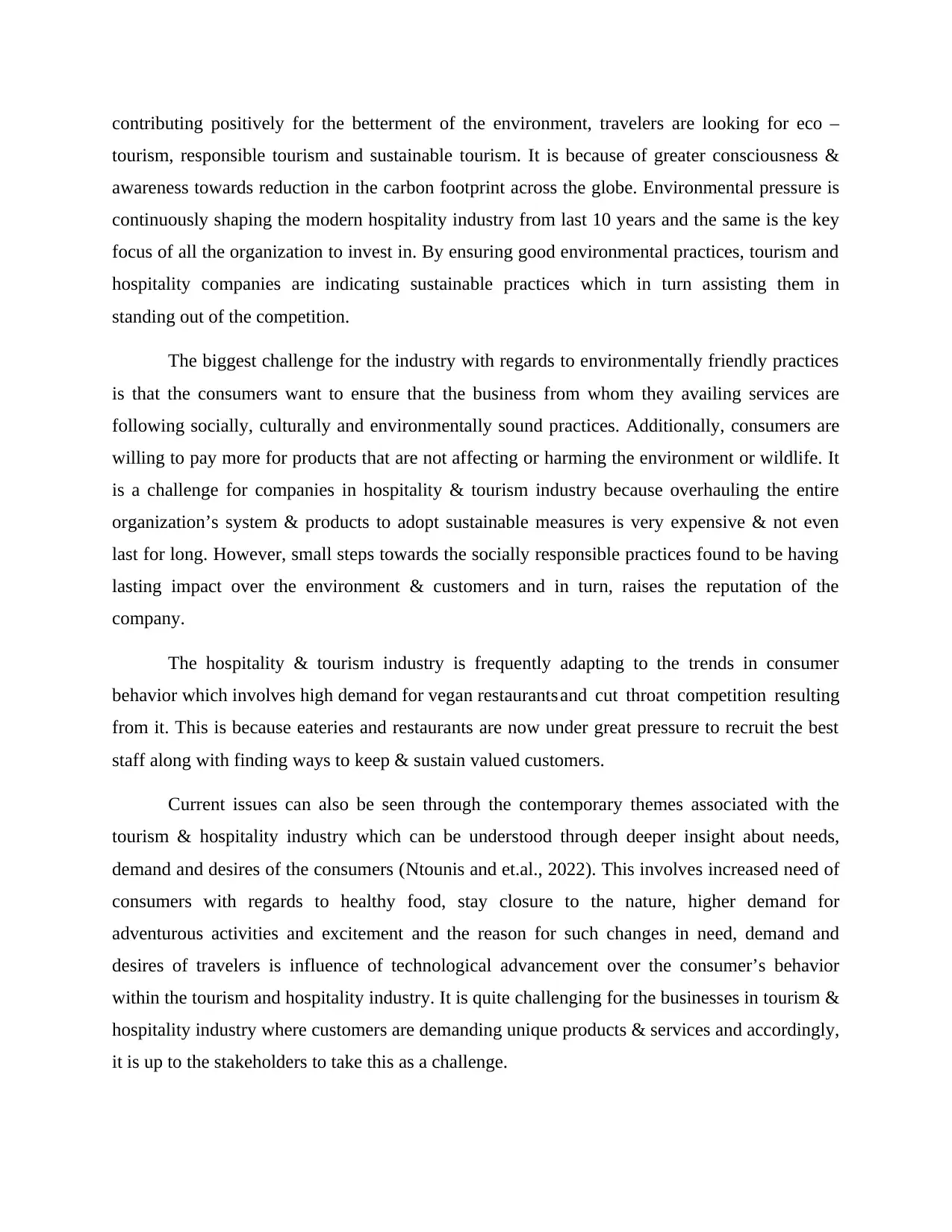
contributing positively for the betterment of the environment, travelers are looking for eco –
tourism, responsible tourism and sustainable tourism. It is because of greater consciousness &
awareness towards reduction in the carbon footprint across the globe. Environmental pressure is
continuously shaping the modern hospitality industry from last 10 years and the same is the key
focus of all the organization to invest in. By ensuring good environmental practices, tourism and
hospitality companies are indicating sustainable practices which in turn assisting them in
standing out of the competition.
The biggest challenge for the industry with regards to environmentally friendly practices
is that the consumers want to ensure that the business from whom they availing services are
following socially, culturally and environmentally sound practices. Additionally, consumers are
willing to pay more for products that are not affecting or harming the environment or wildlife. It
is a challenge for companies in hospitality & tourism industry because overhauling the entire
organization’s system & products to adopt sustainable measures is very expensive & not even
last for long. However, small steps towards the socially responsible practices found to be having
lasting impact over the environment & customers and in turn, raises the reputation of the
company.
The hospitality & tourism industry is frequently adapting to the trends in consumer
behavior which involves high demand for vegan restaurants and cut throat competition resulting
from it. This is because eateries and restaurants are now under great pressure to recruit the best
staff along with finding ways to keep & sustain valued customers.
Current issues can also be seen through the contemporary themes associated with the
tourism & hospitality industry which can be understood through deeper insight about needs,
demand and desires of the consumers (Ntounis and et.al., 2022). This involves increased need of
consumers with regards to healthy food, stay closure to the nature, higher demand for
adventurous activities and excitement and the reason for such changes in need, demand and
desires of travelers is influence of technological advancement over the consumer’s behavior
within the tourism and hospitality industry. It is quite challenging for the businesses in tourism &
hospitality industry where customers are demanding unique products & services and accordingly,
it is up to the stakeholders to take this as a challenge.
tourism, responsible tourism and sustainable tourism. It is because of greater consciousness &
awareness towards reduction in the carbon footprint across the globe. Environmental pressure is
continuously shaping the modern hospitality industry from last 10 years and the same is the key
focus of all the organization to invest in. By ensuring good environmental practices, tourism and
hospitality companies are indicating sustainable practices which in turn assisting them in
standing out of the competition.
The biggest challenge for the industry with regards to environmentally friendly practices
is that the consumers want to ensure that the business from whom they availing services are
following socially, culturally and environmentally sound practices. Additionally, consumers are
willing to pay more for products that are not affecting or harming the environment or wildlife. It
is a challenge for companies in hospitality & tourism industry because overhauling the entire
organization’s system & products to adopt sustainable measures is very expensive & not even
last for long. However, small steps towards the socially responsible practices found to be having
lasting impact over the environment & customers and in turn, raises the reputation of the
company.
The hospitality & tourism industry is frequently adapting to the trends in consumer
behavior which involves high demand for vegan restaurants and cut throat competition resulting
from it. This is because eateries and restaurants are now under great pressure to recruit the best
staff along with finding ways to keep & sustain valued customers.
Current issues can also be seen through the contemporary themes associated with the
tourism & hospitality industry which can be understood through deeper insight about needs,
demand and desires of the consumers (Ntounis and et.al., 2022). This involves increased need of
consumers with regards to healthy food, stay closure to the nature, higher demand for
adventurous activities and excitement and the reason for such changes in need, demand and
desires of travelers is influence of technological advancement over the consumer’s behavior
within the tourism and hospitality industry. It is quite challenging for the businesses in tourism &
hospitality industry where customers are demanding unique products & services and accordingly,
it is up to the stakeholders to take this as a challenge.
Paraphrase This Document
Need a fresh take? Get an instant paraphrase of this document with our AI Paraphraser
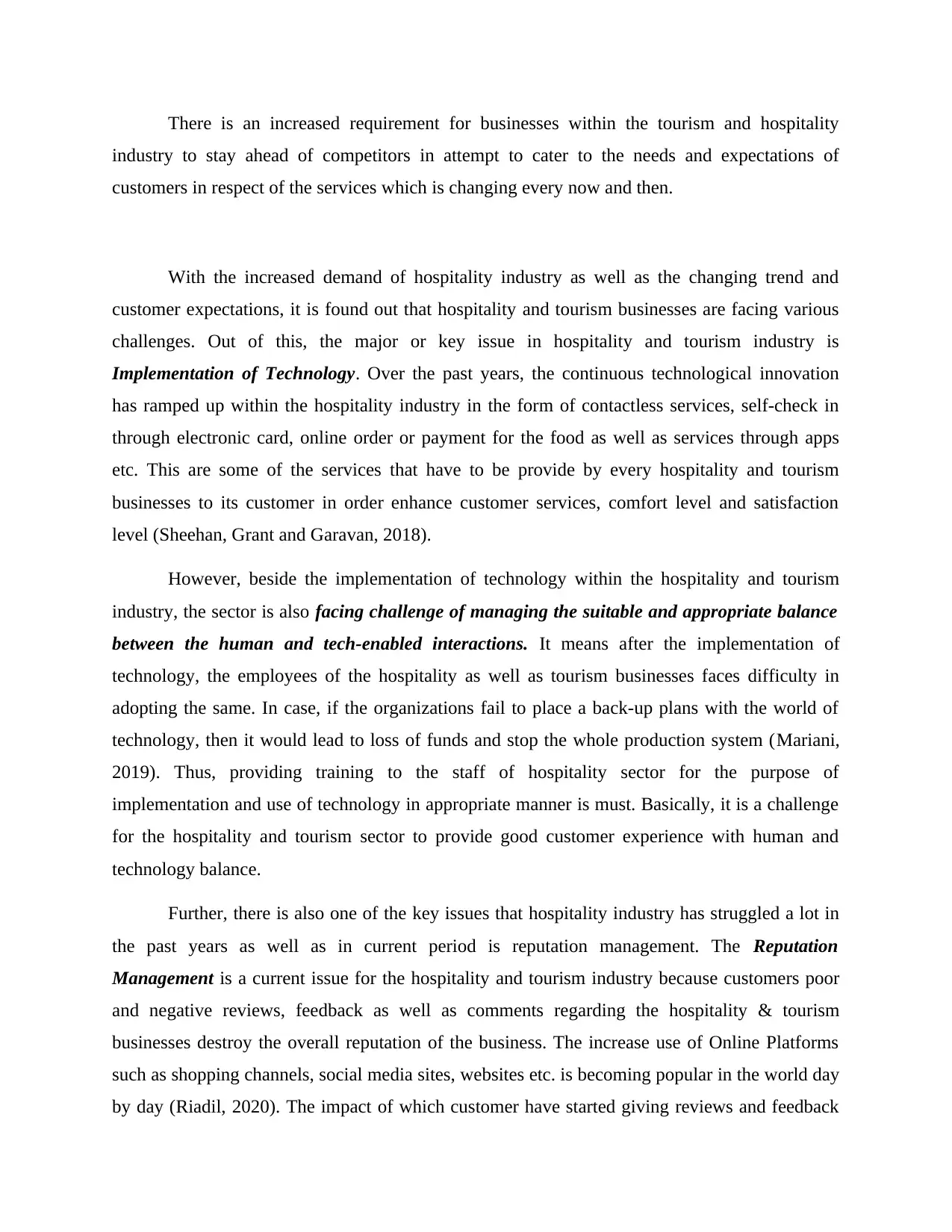
There is an increased requirement for businesses within the tourism and hospitality
industry to stay ahead of competitors in attempt to cater to the needs and expectations of
customers in respect of the services which is changing every now and then.
With the increased demand of hospitality industry as well as the changing trend and
customer expectations, it is found out that hospitality and tourism businesses are facing various
challenges. Out of this, the major or key issue in hospitality and tourism industry is
Implementation of Technology. Over the past years, the continuous technological innovation
has ramped up within the hospitality industry in the form of contactless services, self-check in
through electronic card, online order or payment for the food as well as services through apps
etc. This are some of the services that have to be provide by every hospitality and tourism
businesses to its customer in order enhance customer services, comfort level and satisfaction
level (Sheehan, Grant and Garavan, 2018).
However, beside the implementation of technology within the hospitality and tourism
industry, the sector is also facing challenge of managing the suitable and appropriate balance
between the human and tech-enabled interactions. It means after the implementation of
technology, the employees of the hospitality as well as tourism businesses faces difficulty in
adopting the same. In case, if the organizations fail to place a back-up plans with the world of
technology, then it would lead to loss of funds and stop the whole production system (Mariani,
2019). Thus, providing training to the staff of hospitality sector for the purpose of
implementation and use of technology in appropriate manner is must. Basically, it is a challenge
for the hospitality and tourism sector to provide good customer experience with human and
technology balance.
Further, there is also one of the key issues that hospitality industry has struggled a lot in
the past years as well as in current period is reputation management. The Reputation
Management is a current issue for the hospitality and tourism industry because customers poor
and negative reviews, feedback as well as comments regarding the hospitality & tourism
businesses destroy the overall reputation of the business. The increase use of Online Platforms
such as shopping channels, social media sites, websites etc. is becoming popular in the world day
by day (Riadil, 2020). The impact of which customer have started giving reviews and feedback
industry to stay ahead of competitors in attempt to cater to the needs and expectations of
customers in respect of the services which is changing every now and then.
With the increased demand of hospitality industry as well as the changing trend and
customer expectations, it is found out that hospitality and tourism businesses are facing various
challenges. Out of this, the major or key issue in hospitality and tourism industry is
Implementation of Technology. Over the past years, the continuous technological innovation
has ramped up within the hospitality industry in the form of contactless services, self-check in
through electronic card, online order or payment for the food as well as services through apps
etc. This are some of the services that have to be provide by every hospitality and tourism
businesses to its customer in order enhance customer services, comfort level and satisfaction
level (Sheehan, Grant and Garavan, 2018).
However, beside the implementation of technology within the hospitality and tourism
industry, the sector is also facing challenge of managing the suitable and appropriate balance
between the human and tech-enabled interactions. It means after the implementation of
technology, the employees of the hospitality as well as tourism businesses faces difficulty in
adopting the same. In case, if the organizations fail to place a back-up plans with the world of
technology, then it would lead to loss of funds and stop the whole production system (Mariani,
2019). Thus, providing training to the staff of hospitality sector for the purpose of
implementation and use of technology in appropriate manner is must. Basically, it is a challenge
for the hospitality and tourism sector to provide good customer experience with human and
technology balance.
Further, there is also one of the key issues that hospitality industry has struggled a lot in
the past years as well as in current period is reputation management. The Reputation
Management is a current issue for the hospitality and tourism industry because customers poor
and negative reviews, feedback as well as comments regarding the hospitality & tourism
businesses destroy the overall reputation of the business. The increase use of Online Platforms
such as shopping channels, social media sites, websites etc. is becoming popular in the world day
by day (Riadil, 2020). The impact of which customer have started giving reviews and feedback
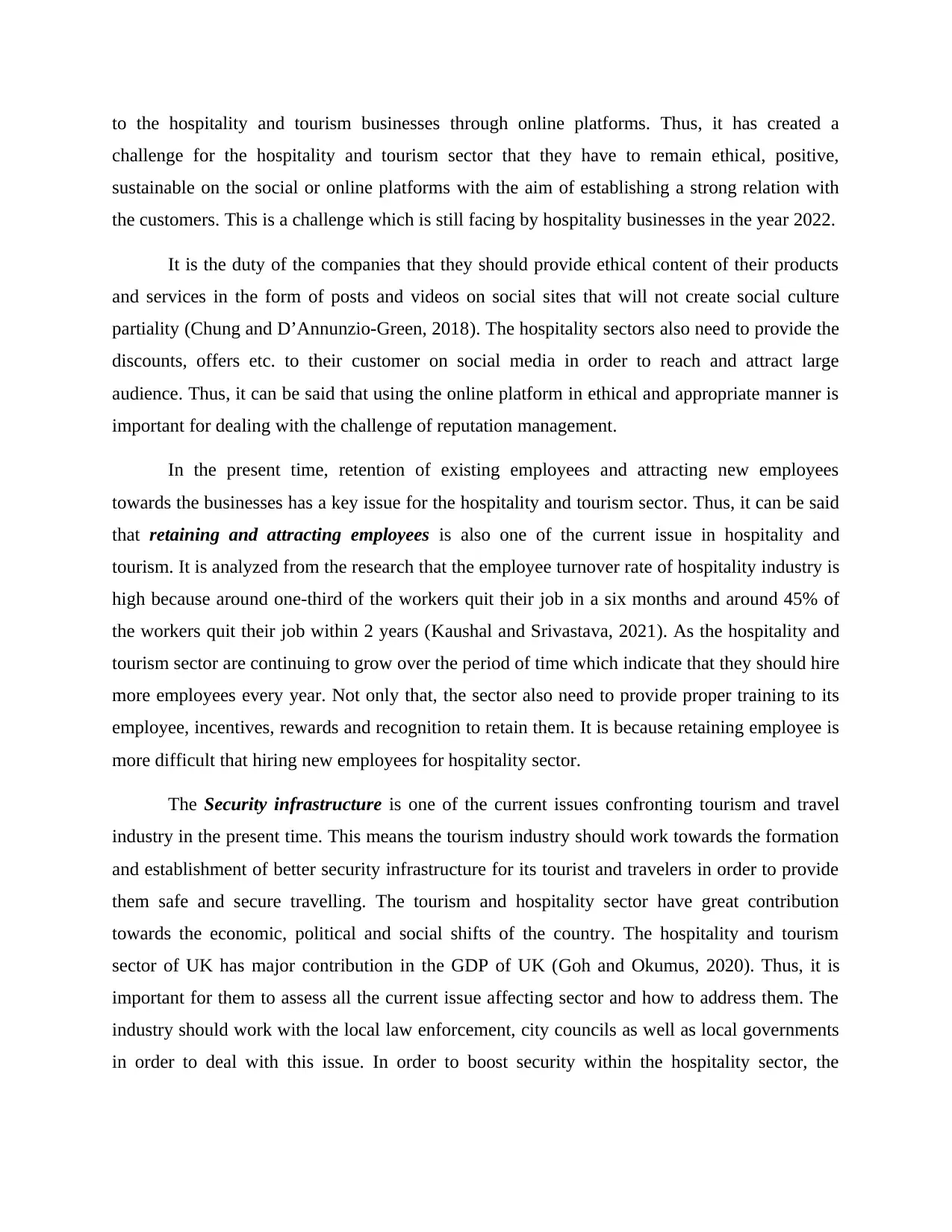
to the hospitality and tourism businesses through online platforms. Thus, it has created a
challenge for the hospitality and tourism sector that they have to remain ethical, positive,
sustainable on the social or online platforms with the aim of establishing a strong relation with
the customers. This is a challenge which is still facing by hospitality businesses in the year 2022.
It is the duty of the companies that they should provide ethical content of their products
and services in the form of posts and videos on social sites that will not create social culture
partiality (Chung and D’Annunzio-Green, 2018). The hospitality sectors also need to provide the
discounts, offers etc. to their customer on social media in order to reach and attract large
audience. Thus, it can be said that using the online platform in ethical and appropriate manner is
important for dealing with the challenge of reputation management.
In the present time, retention of existing employees and attracting new employees
towards the businesses has a key issue for the hospitality and tourism sector. Thus, it can be said
that retaining and attracting employees is also one of the current issue in hospitality and
tourism. It is analyzed from the research that the employee turnover rate of hospitality industry is
high because around one-third of the workers quit their job in a six months and around 45% of
the workers quit their job within 2 years (Kaushal and Srivastava, 2021). As the hospitality and
tourism sector are continuing to grow over the period of time which indicate that they should hire
more employees every year. Not only that, the sector also need to provide proper training to its
employee, incentives, rewards and recognition to retain them. It is because retaining employee is
more difficult that hiring new employees for hospitality sector.
The Security infrastructure is one of the current issues confronting tourism and travel
industry in the present time. This means the tourism industry should work towards the formation
and establishment of better security infrastructure for its tourist and travelers in order to provide
them safe and secure travelling. The tourism and hospitality sector have great contribution
towards the economic, political and social shifts of the country. The hospitality and tourism
sector of UK has major contribution in the GDP of UK (Goh and Okumus, 2020). Thus, it is
important for them to assess all the current issue affecting sector and how to address them. The
industry should work with the local law enforcement, city councils as well as local governments
in order to deal with this issue. In order to boost security within the hospitality sector, the
challenge for the hospitality and tourism sector that they have to remain ethical, positive,
sustainable on the social or online platforms with the aim of establishing a strong relation with
the customers. This is a challenge which is still facing by hospitality businesses in the year 2022.
It is the duty of the companies that they should provide ethical content of their products
and services in the form of posts and videos on social sites that will not create social culture
partiality (Chung and D’Annunzio-Green, 2018). The hospitality sectors also need to provide the
discounts, offers etc. to their customer on social media in order to reach and attract large
audience. Thus, it can be said that using the online platform in ethical and appropriate manner is
important for dealing with the challenge of reputation management.
In the present time, retention of existing employees and attracting new employees
towards the businesses has a key issue for the hospitality and tourism sector. Thus, it can be said
that retaining and attracting employees is also one of the current issue in hospitality and
tourism. It is analyzed from the research that the employee turnover rate of hospitality industry is
high because around one-third of the workers quit their job in a six months and around 45% of
the workers quit their job within 2 years (Kaushal and Srivastava, 2021). As the hospitality and
tourism sector are continuing to grow over the period of time which indicate that they should hire
more employees every year. Not only that, the sector also need to provide proper training to its
employee, incentives, rewards and recognition to retain them. It is because retaining employee is
more difficult that hiring new employees for hospitality sector.
The Security infrastructure is one of the current issues confronting tourism and travel
industry in the present time. This means the tourism industry should work towards the formation
and establishment of better security infrastructure for its tourist and travelers in order to provide
them safe and secure travelling. The tourism and hospitality sector have great contribution
towards the economic, political and social shifts of the country. The hospitality and tourism
sector of UK has major contribution in the GDP of UK (Goh and Okumus, 2020). Thus, it is
important for them to assess all the current issue affecting sector and how to address them. The
industry should work with the local law enforcement, city councils as well as local governments
in order to deal with this issue. In order to boost security within the hospitality sector, the
⊘ This is a preview!⊘
Do you want full access?
Subscribe today to unlock all pages.

Trusted by 1+ million students worldwide
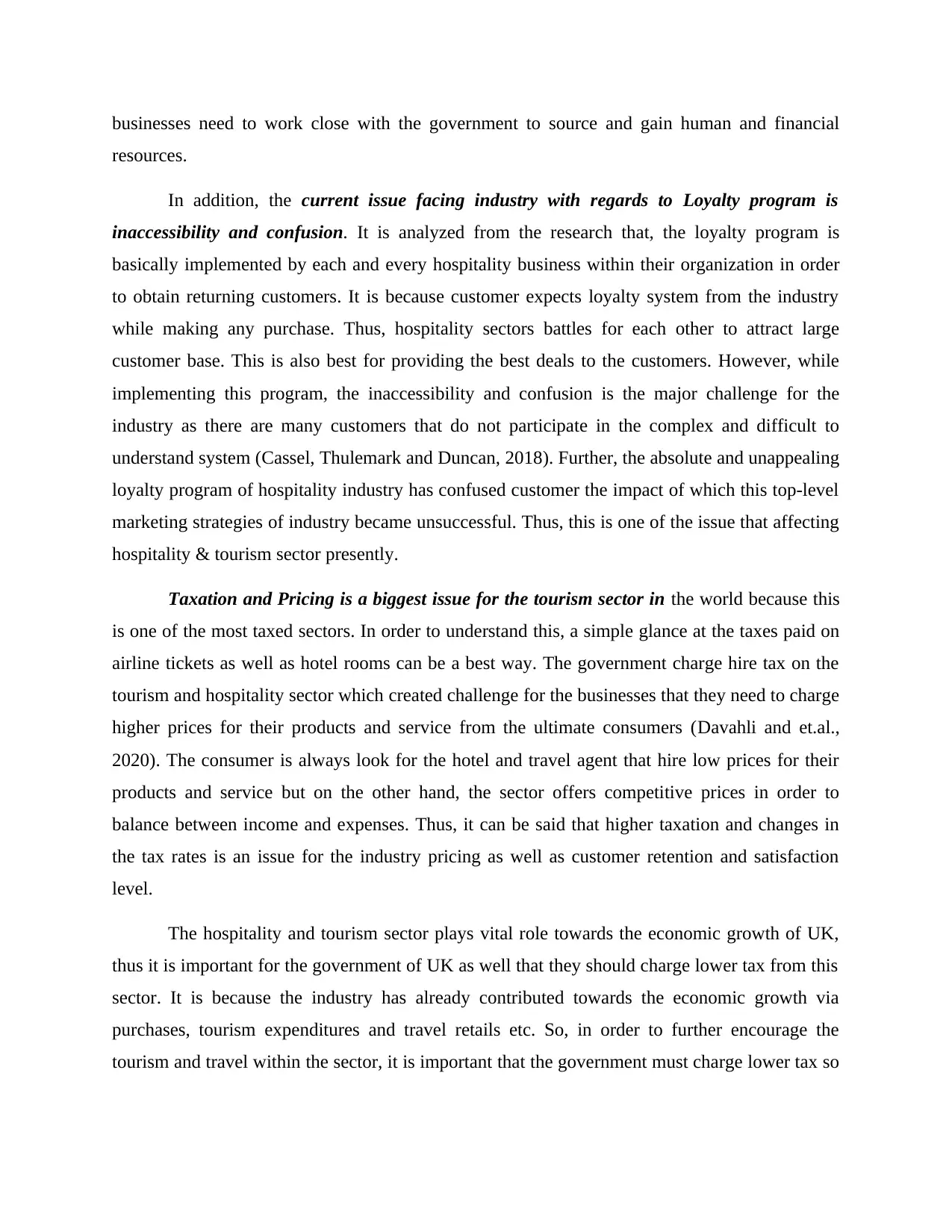
businesses need to work close with the government to source and gain human and financial
resources.
In addition, the current issue facing industry with regards to Loyalty program is
inaccessibility and confusion. It is analyzed from the research that, the loyalty program is
basically implemented by each and every hospitality business within their organization in order
to obtain returning customers. It is because customer expects loyalty system from the industry
while making any purchase. Thus, hospitality sectors battles for each other to attract large
customer base. This is also best for providing the best deals to the customers. However, while
implementing this program, the inaccessibility and confusion is the major challenge for the
industry as there are many customers that do not participate in the complex and difficult to
understand system (Cassel, Thulemark and Duncan, 2018). Further, the absolute and unappealing
loyalty program of hospitality industry has confused customer the impact of which this top-level
marketing strategies of industry became unsuccessful. Thus, this is one of the issue that affecting
hospitality & tourism sector presently.
Taxation and Pricing is a biggest issue for the tourism sector in the world because this
is one of the most taxed sectors. In order to understand this, a simple glance at the taxes paid on
airline tickets as well as hotel rooms can be a best way. The government charge hire tax on the
tourism and hospitality sector which created challenge for the businesses that they need to charge
higher prices for their products and service from the ultimate consumers (Davahli and et.al.,
2020). The consumer is always look for the hotel and travel agent that hire low prices for their
products and service but on the other hand, the sector offers competitive prices in order to
balance between income and expenses. Thus, it can be said that higher taxation and changes in
the tax rates is an issue for the industry pricing as well as customer retention and satisfaction
level.
The hospitality and tourism sector plays vital role towards the economic growth of UK,
thus it is important for the government of UK as well that they should charge lower tax from this
sector. It is because the industry has already contributed towards the economic growth via
purchases, tourism expenditures and travel retails etc. So, in order to further encourage the
tourism and travel within the sector, it is important that the government must charge lower tax so
resources.
In addition, the current issue facing industry with regards to Loyalty program is
inaccessibility and confusion. It is analyzed from the research that, the loyalty program is
basically implemented by each and every hospitality business within their organization in order
to obtain returning customers. It is because customer expects loyalty system from the industry
while making any purchase. Thus, hospitality sectors battles for each other to attract large
customer base. This is also best for providing the best deals to the customers. However, while
implementing this program, the inaccessibility and confusion is the major challenge for the
industry as there are many customers that do not participate in the complex and difficult to
understand system (Cassel, Thulemark and Duncan, 2018). Further, the absolute and unappealing
loyalty program of hospitality industry has confused customer the impact of which this top-level
marketing strategies of industry became unsuccessful. Thus, this is one of the issue that affecting
hospitality & tourism sector presently.
Taxation and Pricing is a biggest issue for the tourism sector in the world because this
is one of the most taxed sectors. In order to understand this, a simple glance at the taxes paid on
airline tickets as well as hotel rooms can be a best way. The government charge hire tax on the
tourism and hospitality sector which created challenge for the businesses that they need to charge
higher prices for their products and service from the ultimate consumers (Davahli and et.al.,
2020). The consumer is always look for the hotel and travel agent that hire low prices for their
products and service but on the other hand, the sector offers competitive prices in order to
balance between income and expenses. Thus, it can be said that higher taxation and changes in
the tax rates is an issue for the industry pricing as well as customer retention and satisfaction
level.
The hospitality and tourism sector plays vital role towards the economic growth of UK,
thus it is important for the government of UK as well that they should charge lower tax from this
sector. It is because the industry has already contributed towards the economic growth via
purchases, tourism expenditures and travel retails etc. So, in order to further encourage the
tourism and travel within the sector, it is important that the government must charge lower tax so
Paraphrase This Document
Need a fresh take? Get an instant paraphrase of this document with our AI Paraphraser
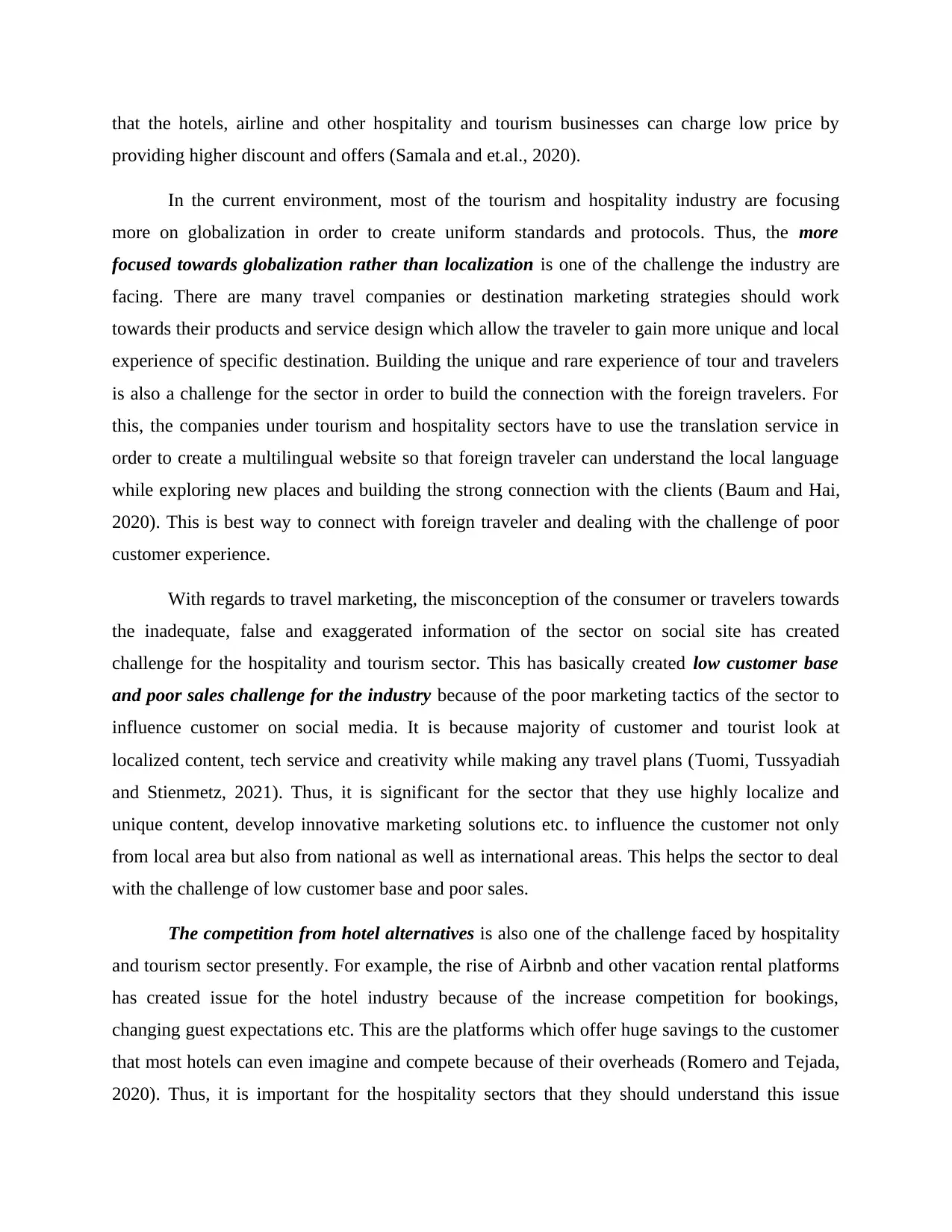
that the hotels, airline and other hospitality and tourism businesses can charge low price by
providing higher discount and offers (Samala and et.al., 2020).
In the current environment, most of the tourism and hospitality industry are focusing
more on globalization in order to create uniform standards and protocols. Thus, the more
focused towards globalization rather than localization is one of the challenge the industry are
facing. There are many travel companies or destination marketing strategies should work
towards their products and service design which allow the traveler to gain more unique and local
experience of specific destination. Building the unique and rare experience of tour and travelers
is also a challenge for the sector in order to build the connection with the foreign travelers. For
this, the companies under tourism and hospitality sectors have to use the translation service in
order to create a multilingual website so that foreign traveler can understand the local language
while exploring new places and building the strong connection with the clients (Baum and Hai,
2020). This is best way to connect with foreign traveler and dealing with the challenge of poor
customer experience.
With regards to travel marketing, the misconception of the consumer or travelers towards
the inadequate, false and exaggerated information of the sector on social site has created
challenge for the hospitality and tourism sector. This has basically created low customer base
and poor sales challenge for the industry because of the poor marketing tactics of the sector to
influence customer on social media. It is because majority of customer and tourist look at
localized content, tech service and creativity while making any travel plans (Tuomi, Tussyadiah
and Stienmetz, 2021). Thus, it is significant for the sector that they use highly localize and
unique content, develop innovative marketing solutions etc. to influence the customer not only
from local area but also from national as well as international areas. This helps the sector to deal
with the challenge of low customer base and poor sales.
The competition from hotel alternatives is also one of the challenge faced by hospitality
and tourism sector presently. For example, the rise of Airbnb and other vacation rental platforms
has created issue for the hotel industry because of the increase competition for bookings,
changing guest expectations etc. This are the platforms which offer huge savings to the customer
that most hotels can even imagine and compete because of their overheads (Romero and Tejada,
2020). Thus, it is important for the hospitality sectors that they should understand this issue
providing higher discount and offers (Samala and et.al., 2020).
In the current environment, most of the tourism and hospitality industry are focusing
more on globalization in order to create uniform standards and protocols. Thus, the more
focused towards globalization rather than localization is one of the challenge the industry are
facing. There are many travel companies or destination marketing strategies should work
towards their products and service design which allow the traveler to gain more unique and local
experience of specific destination. Building the unique and rare experience of tour and travelers
is also a challenge for the sector in order to build the connection with the foreign travelers. For
this, the companies under tourism and hospitality sectors have to use the translation service in
order to create a multilingual website so that foreign traveler can understand the local language
while exploring new places and building the strong connection with the clients (Baum and Hai,
2020). This is best way to connect with foreign traveler and dealing with the challenge of poor
customer experience.
With regards to travel marketing, the misconception of the consumer or travelers towards
the inadequate, false and exaggerated information of the sector on social site has created
challenge for the hospitality and tourism sector. This has basically created low customer base
and poor sales challenge for the industry because of the poor marketing tactics of the sector to
influence customer on social media. It is because majority of customer and tourist look at
localized content, tech service and creativity while making any travel plans (Tuomi, Tussyadiah
and Stienmetz, 2021). Thus, it is significant for the sector that they use highly localize and
unique content, develop innovative marketing solutions etc. to influence the customer not only
from local area but also from national as well as international areas. This helps the sector to deal
with the challenge of low customer base and poor sales.
The competition from hotel alternatives is also one of the challenge faced by hospitality
and tourism sector presently. For example, the rise of Airbnb and other vacation rental platforms
has created issue for the hotel industry because of the increase competition for bookings,
changing guest expectations etc. This are the platforms which offer huge savings to the customer
that most hotels can even imagine and compete because of their overheads (Romero and Tejada,
2020). Thus, it is important for the hospitality sectors that they should understand this issue
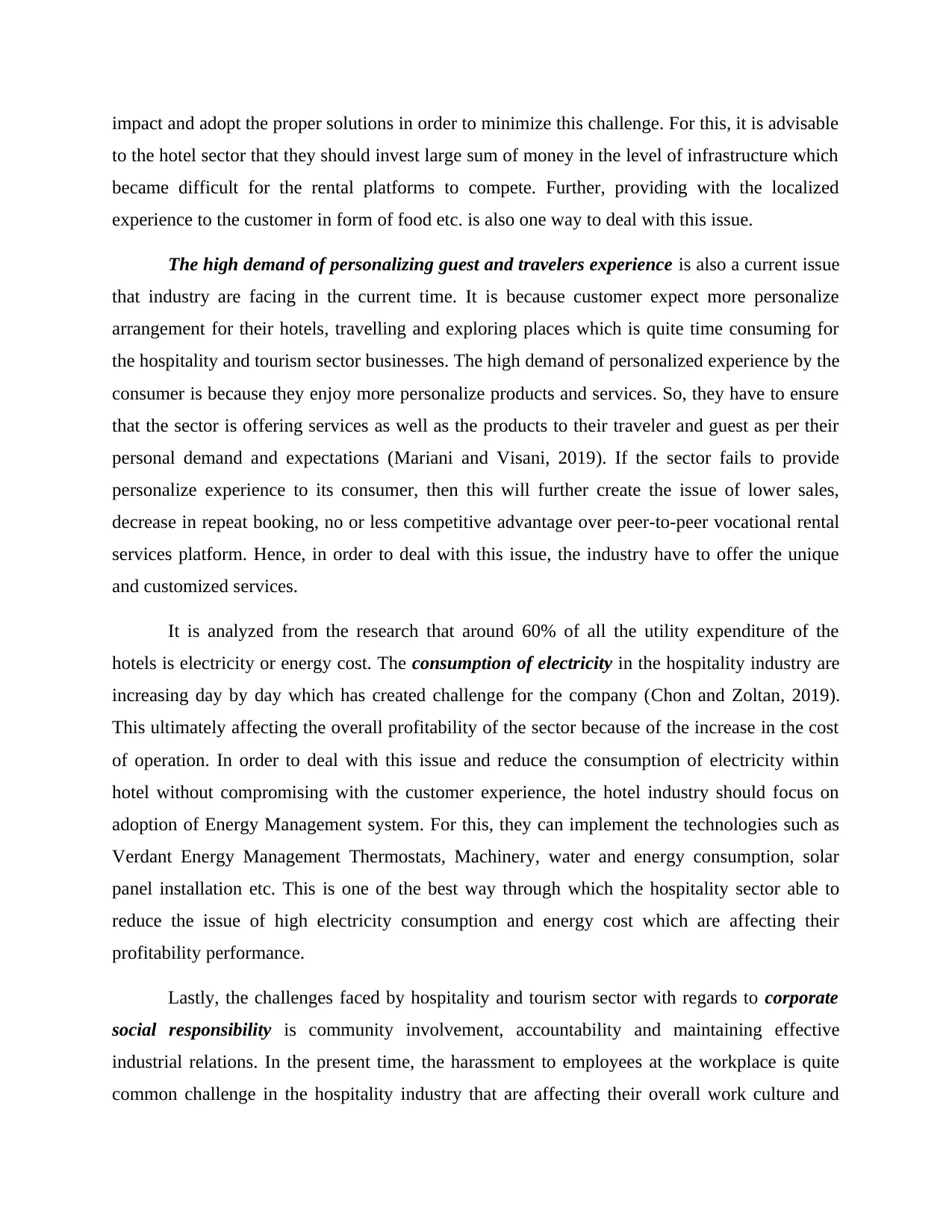
impact and adopt the proper solutions in order to minimize this challenge. For this, it is advisable
to the hotel sector that they should invest large sum of money in the level of infrastructure which
became difficult for the rental platforms to compete. Further, providing with the localized
experience to the customer in form of food etc. is also one way to deal with this issue.
The high demand of personalizing guest and travelers experience is also a current issue
that industry are facing in the current time. It is because customer expect more personalize
arrangement for their hotels, travelling and exploring places which is quite time consuming for
the hospitality and tourism sector businesses. The high demand of personalized experience by the
consumer is because they enjoy more personalize products and services. So, they have to ensure
that the sector is offering services as well as the products to their traveler and guest as per their
personal demand and expectations (Mariani and Visani, 2019). If the sector fails to provide
personalize experience to its consumer, then this will further create the issue of lower sales,
decrease in repeat booking, no or less competitive advantage over peer-to-peer vocational rental
services platform. Hence, in order to deal with this issue, the industry have to offer the unique
and customized services.
It is analyzed from the research that around 60% of all the utility expenditure of the
hotels is electricity or energy cost. The consumption of electricity in the hospitality industry are
increasing day by day which has created challenge for the company (Chon and Zoltan, 2019).
This ultimately affecting the overall profitability of the sector because of the increase in the cost
of operation. In order to deal with this issue and reduce the consumption of electricity within
hotel without compromising with the customer experience, the hotel industry should focus on
adoption of Energy Management system. For this, they can implement the technologies such as
Verdant Energy Management Thermostats, Machinery, water and energy consumption, solar
panel installation etc. This is one of the best way through which the hospitality sector able to
reduce the issue of high electricity consumption and energy cost which are affecting their
profitability performance.
Lastly, the challenges faced by hospitality and tourism sector with regards to corporate
social responsibility is community involvement, accountability and maintaining effective
industrial relations. In the present time, the harassment to employees at the workplace is quite
common challenge in the hospitality industry that are affecting their overall work culture and
to the hotel sector that they should invest large sum of money in the level of infrastructure which
became difficult for the rental platforms to compete. Further, providing with the localized
experience to the customer in form of food etc. is also one way to deal with this issue.
The high demand of personalizing guest and travelers experience is also a current issue
that industry are facing in the current time. It is because customer expect more personalize
arrangement for their hotels, travelling and exploring places which is quite time consuming for
the hospitality and tourism sector businesses. The high demand of personalized experience by the
consumer is because they enjoy more personalize products and services. So, they have to ensure
that the sector is offering services as well as the products to their traveler and guest as per their
personal demand and expectations (Mariani and Visani, 2019). If the sector fails to provide
personalize experience to its consumer, then this will further create the issue of lower sales,
decrease in repeat booking, no or less competitive advantage over peer-to-peer vocational rental
services platform. Hence, in order to deal with this issue, the industry have to offer the unique
and customized services.
It is analyzed from the research that around 60% of all the utility expenditure of the
hotels is electricity or energy cost. The consumption of electricity in the hospitality industry are
increasing day by day which has created challenge for the company (Chon and Zoltan, 2019).
This ultimately affecting the overall profitability of the sector because of the increase in the cost
of operation. In order to deal with this issue and reduce the consumption of electricity within
hotel without compromising with the customer experience, the hotel industry should focus on
adoption of Energy Management system. For this, they can implement the technologies such as
Verdant Energy Management Thermostats, Machinery, water and energy consumption, solar
panel installation etc. This is one of the best way through which the hospitality sector able to
reduce the issue of high electricity consumption and energy cost which are affecting their
profitability performance.
Lastly, the challenges faced by hospitality and tourism sector with regards to corporate
social responsibility is community involvement, accountability and maintaining effective
industrial relations. In the present time, the harassment to employees at the workplace is quite
common challenge in the hospitality industry that are affecting their overall work culture and
⊘ This is a preview!⊘
Do you want full access?
Subscribe today to unlock all pages.

Trusted by 1+ million students worldwide
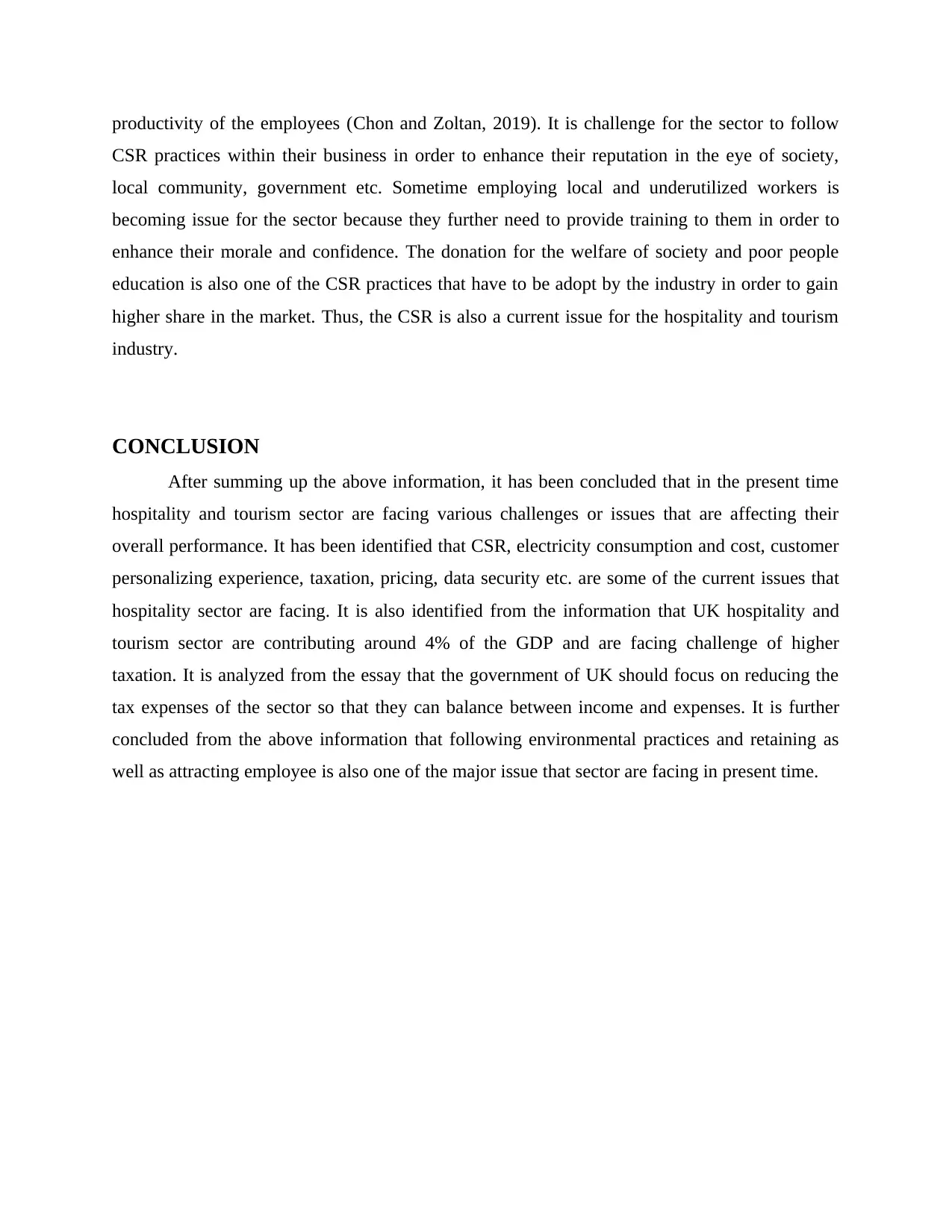
productivity of the employees (Chon and Zoltan, 2019). It is challenge for the sector to follow
CSR practices within their business in order to enhance their reputation in the eye of society,
local community, government etc. Sometime employing local and underutilized workers is
becoming issue for the sector because they further need to provide training to them in order to
enhance their morale and confidence. The donation for the welfare of society and poor people
education is also one of the CSR practices that have to be adopt by the industry in order to gain
higher share in the market. Thus, the CSR is also a current issue for the hospitality and tourism
industry.
CONCLUSION
After summing up the above information, it has been concluded that in the present time
hospitality and tourism sector are facing various challenges or issues that are affecting their
overall performance. It has been identified that CSR, electricity consumption and cost, customer
personalizing experience, taxation, pricing, data security etc. are some of the current issues that
hospitality sector are facing. It is also identified from the information that UK hospitality and
tourism sector are contributing around 4% of the GDP and are facing challenge of higher
taxation. It is analyzed from the essay that the government of UK should focus on reducing the
tax expenses of the sector so that they can balance between income and expenses. It is further
concluded from the above information that following environmental practices and retaining as
well as attracting employee is also one of the major issue that sector are facing in present time.
CSR practices within their business in order to enhance their reputation in the eye of society,
local community, government etc. Sometime employing local and underutilized workers is
becoming issue for the sector because they further need to provide training to them in order to
enhance their morale and confidence. The donation for the welfare of society and poor people
education is also one of the CSR practices that have to be adopt by the industry in order to gain
higher share in the market. Thus, the CSR is also a current issue for the hospitality and tourism
industry.
CONCLUSION
After summing up the above information, it has been concluded that in the present time
hospitality and tourism sector are facing various challenges or issues that are affecting their
overall performance. It has been identified that CSR, electricity consumption and cost, customer
personalizing experience, taxation, pricing, data security etc. are some of the current issues that
hospitality sector are facing. It is also identified from the information that UK hospitality and
tourism sector are contributing around 4% of the GDP and are facing challenge of higher
taxation. It is analyzed from the essay that the government of UK should focus on reducing the
tax expenses of the sector so that they can balance between income and expenses. It is further
concluded from the above information that following environmental practices and retaining as
well as attracting employee is also one of the major issue that sector are facing in present time.
Paraphrase This Document
Need a fresh take? Get an instant paraphrase of this document with our AI Paraphraser
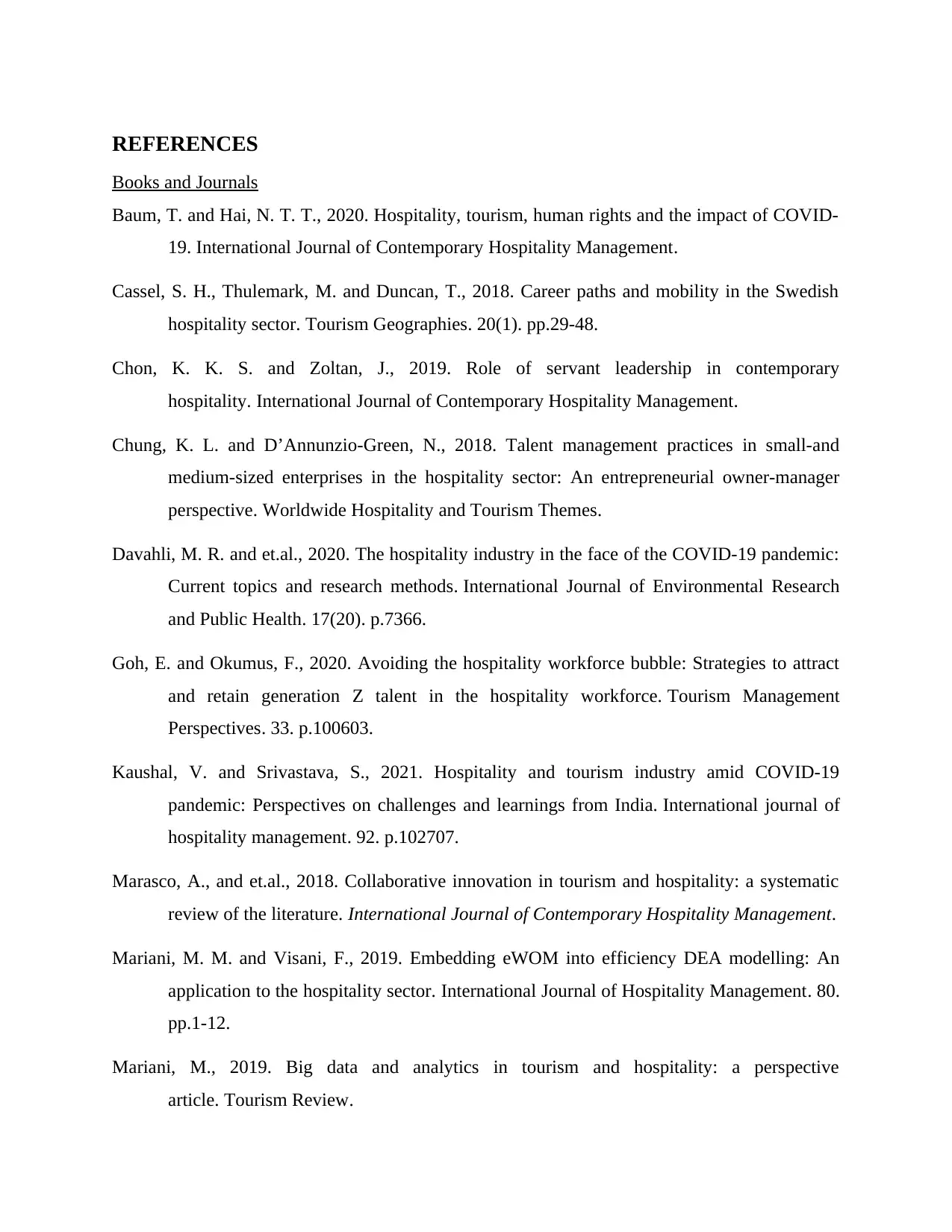
REFERENCES
Books and Journals
Baum, T. and Hai, N. T. T., 2020. Hospitality, tourism, human rights and the impact of COVID-
19. International Journal of Contemporary Hospitality Management.
Cassel, S. H., Thulemark, M. and Duncan, T., 2018. Career paths and mobility in the Swedish
hospitality sector. Tourism Geographies. 20(1). pp.29-48.
Chon, K. K. S. and Zoltan, J., 2019. Role of servant leadership in contemporary
hospitality. International Journal of Contemporary Hospitality Management.
Chung, K. L. and D’Annunzio-Green, N., 2018. Talent management practices in small-and
medium-sized enterprises in the hospitality sector: An entrepreneurial owner-manager
perspective. Worldwide Hospitality and Tourism Themes.
Davahli, M. R. and et.al., 2020. The hospitality industry in the face of the COVID-19 pandemic:
Current topics and research methods. International Journal of Environmental Research
and Public Health. 17(20). p.7366.
Goh, E. and Okumus, F., 2020. Avoiding the hospitality workforce bubble: Strategies to attract
and retain generation Z talent in the hospitality workforce. Tourism Management
Perspectives. 33. p.100603.
Kaushal, V. and Srivastava, S., 2021. Hospitality and tourism industry amid COVID-19
pandemic: Perspectives on challenges and learnings from India. International journal of
hospitality management. 92. p.102707.
Marasco, A., and et.al., 2018. Collaborative innovation in tourism and hospitality: a systematic
review of the literature. International Journal of Contemporary Hospitality Management.
Mariani, M. M. and Visani, F., 2019. Embedding eWOM into efficiency DEA modelling: An
application to the hospitality sector. International Journal of Hospitality Management. 80.
pp.1-12.
Mariani, M., 2019. Big data and analytics in tourism and hospitality: a perspective
article. Tourism Review.
Books and Journals
Baum, T. and Hai, N. T. T., 2020. Hospitality, tourism, human rights and the impact of COVID-
19. International Journal of Contemporary Hospitality Management.
Cassel, S. H., Thulemark, M. and Duncan, T., 2018. Career paths and mobility in the Swedish
hospitality sector. Tourism Geographies. 20(1). pp.29-48.
Chon, K. K. S. and Zoltan, J., 2019. Role of servant leadership in contemporary
hospitality. International Journal of Contemporary Hospitality Management.
Chung, K. L. and D’Annunzio-Green, N., 2018. Talent management practices in small-and
medium-sized enterprises in the hospitality sector: An entrepreneurial owner-manager
perspective. Worldwide Hospitality and Tourism Themes.
Davahli, M. R. and et.al., 2020. The hospitality industry in the face of the COVID-19 pandemic:
Current topics and research methods. International Journal of Environmental Research
and Public Health. 17(20). p.7366.
Goh, E. and Okumus, F., 2020. Avoiding the hospitality workforce bubble: Strategies to attract
and retain generation Z talent in the hospitality workforce. Tourism Management
Perspectives. 33. p.100603.
Kaushal, V. and Srivastava, S., 2021. Hospitality and tourism industry amid COVID-19
pandemic: Perspectives on challenges and learnings from India. International journal of
hospitality management. 92. p.102707.
Marasco, A., and et.al., 2018. Collaborative innovation in tourism and hospitality: a systematic
review of the literature. International Journal of Contemporary Hospitality Management.
Mariani, M. M. and Visani, F., 2019. Embedding eWOM into efficiency DEA modelling: An
application to the hospitality sector. International Journal of Hospitality Management. 80.
pp.1-12.
Mariani, M., 2019. Big data and analytics in tourism and hospitality: a perspective
article. Tourism Review.
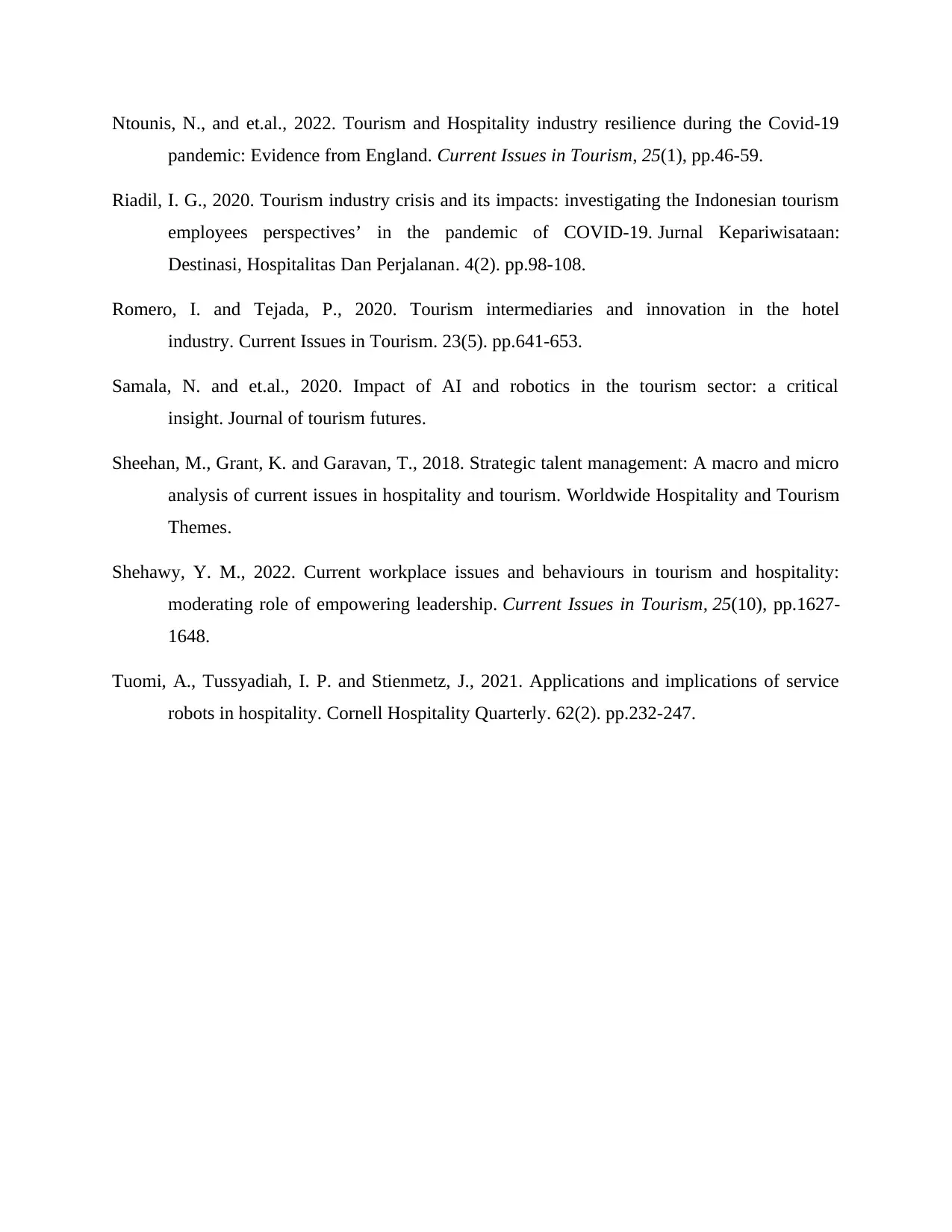
Ntounis, N., and et.al., 2022. Tourism and Hospitality industry resilience during the Covid-19
pandemic: Evidence from England. Current Issues in Tourism, 25(1), pp.46-59.
Riadil, I. G., 2020. Tourism industry crisis and its impacts: investigating the Indonesian tourism
employees perspectives’ in the pandemic of COVID-19. Jurnal Kepariwisataan:
Destinasi, Hospitalitas Dan Perjalanan. 4(2). pp.98-108.
Romero, I. and Tejada, P., 2020. Tourism intermediaries and innovation in the hotel
industry. Current Issues in Tourism. 23(5). pp.641-653.
Samala, N. and et.al., 2020. Impact of AI and robotics in the tourism sector: a critical
insight. Journal of tourism futures.
Sheehan, M., Grant, K. and Garavan, T., 2018. Strategic talent management: A macro and micro
analysis of current issues in hospitality and tourism. Worldwide Hospitality and Tourism
Themes.
Shehawy, Y. M., 2022. Current workplace issues and behaviours in tourism and hospitality:
moderating role of empowering leadership. Current Issues in Tourism, 25(10), pp.1627-
1648.
Tuomi, A., Tussyadiah, I. P. and Stienmetz, J., 2021. Applications and implications of service
robots in hospitality. Cornell Hospitality Quarterly. 62(2). pp.232-247.
pandemic: Evidence from England. Current Issues in Tourism, 25(1), pp.46-59.
Riadil, I. G., 2020. Tourism industry crisis and its impacts: investigating the Indonesian tourism
employees perspectives’ in the pandemic of COVID-19. Jurnal Kepariwisataan:
Destinasi, Hospitalitas Dan Perjalanan. 4(2). pp.98-108.
Romero, I. and Tejada, P., 2020. Tourism intermediaries and innovation in the hotel
industry. Current Issues in Tourism. 23(5). pp.641-653.
Samala, N. and et.al., 2020. Impact of AI and robotics in the tourism sector: a critical
insight. Journal of tourism futures.
Sheehan, M., Grant, K. and Garavan, T., 2018. Strategic talent management: A macro and micro
analysis of current issues in hospitality and tourism. Worldwide Hospitality and Tourism
Themes.
Shehawy, Y. M., 2022. Current workplace issues and behaviours in tourism and hospitality:
moderating role of empowering leadership. Current Issues in Tourism, 25(10), pp.1627-
1648.
Tuomi, A., Tussyadiah, I. P. and Stienmetz, J., 2021. Applications and implications of service
robots in hospitality. Cornell Hospitality Quarterly. 62(2). pp.232-247.
⊘ This is a preview!⊘
Do you want full access?
Subscribe today to unlock all pages.

Trusted by 1+ million students worldwide
1 out of 12